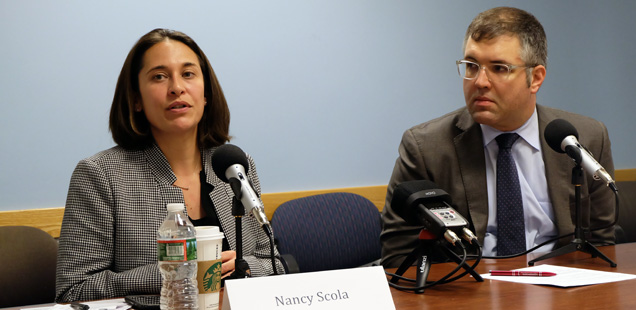
Center News
Ken Burns to give Theodore H. White Lecture on Press and Politics
Newsletter

Our weekly roundup of news found at the intersection of media, politics, policy and technology, from the Shorenstein Center and from around the web. Sign up to receive Media and Politics Must Reads in your inbox each week. Also connect with us on Twitter and Facebook for more updates.
Politico’s Nancy Scola: Reporting on and Regulating the Tech Industry. Nancy Scola, senior technology reporter for Politico, discussed the regulation of tech platforms, their role in the 2016 election, cyber security, and more.
Jackie Calmes of the Los Angeles Times: Conservative Media and U.S. Politics. Jackie Calmes, White House editor for the Los Angeles Times Washington bureau, discussed the evolution of conservative media and its relationship with the GOP, and the challenges of covering the White House.
Maybe the future of American news publishing is…Europe? (and other bleak ad-related scenarios). Highlights from “The Future of Advertising and Publishing: Finding New Revenue Models for Journalism in the Digital Age,” an event hosted by the Tow Center for Digital Journalism at Columbia University, the Digital Initiative at Harvard Business School and the Shorenstein Center.
Experts Discuss Role of ‘Prosperity Gospel’ in Trump’s Success. Shorenstein Center Director Nicco Mele moderated a discussion about theology, wealth, and President Trump’s popularity among evangelicals. With E.J. Dionne, Jr., William H. Bloomberg Visiting Professor; author Sally Quinn; and Jonathan L. Walton, Professor of Religion and Society at Harvard Divinity School.
Can Facebook or Google be regulated? “‘There is an emerging feeling in the country, especially among our leaders, that these companies have too much power,’ said Nicco Mele, director of the Shorenstein Center at Harvard University’s Kennedy School.”
The World’s Top Female Journalists Are Honored at The Courage in Journalism Awards. Congratulations to two former Shorenstein Center fellows, Deborah Amos and Michele Norris, who received awards from the International Women’s Media Foundation.
Bob Schieffer sees information overload. The Harvard Gazette interviews the former Walter Shorenstein Media and Democracy Fellow about “the chaotic state of national politics and media coverage, and how Facebook, Twitter, and other social media — and ordinary news consumers — need to adapt to the new realities.”
Now more than ever, political discussion is critical, professor says. Thomas E. Patterson, Bradlee Professor of Government and the Press, discussed how public opinion shapes laws, using gun control as a case study.
Weinstein Is No Watershed. Jeff Seglin, Senior Lecturer in Public Policy and Shorenstein Center faculty affiliate, says that “There should be a mechanism for allowing those who experience such behavior to report it in such a way that it can be documented, validated, responded to and used to hold those who are guilty of inappropriate behavior accountable. Toll-free hotlines and HR departments do not seem to be the solution.”
Weinstein’s Abuse Mimicked the Original Film Moguls He Revered. Neal Gabler, fall 2011 fellow, writes that “if Weinstein played the role of the predatory mogul, the other part of this story is that his employees, colleagues, would-be collaborators, agents and some entertainment reporters played the role of enablers, just like the enablers of the studio chieftains in the old days.”
Normalizing white nationalist hate: Panel examines movement’s rise to prominence, discusses ways to lessen it. Khalil G. Muhammad, Professor of History, Race, and Public Policy and Shorenstein Center faculty affiliate, discussed how “the movement geared up during Barack Obama’s presidency.”
For black athletes, wealth doesn’t equal freedom. Leah Wright Rigueur, Assistant Professor of Public Policy and Shorenstein Center faculty affiliate, writes that “Black athletes – and entertainers – have long been hyper-aware of their peculiar place in American society as individuals beloved for their athletic and artistic talents, yet reviled the moment they use their public platform to protest systemic racial inequality.”
The Age of Arthur: A new biography reminds us why Arthur M. Schlesinger Jr. and his cohort fell out of fashion, and why that judgment was unfair. A book review by Richard Parker, Lecturer in Public Policy.

Center News

Center News

Center News